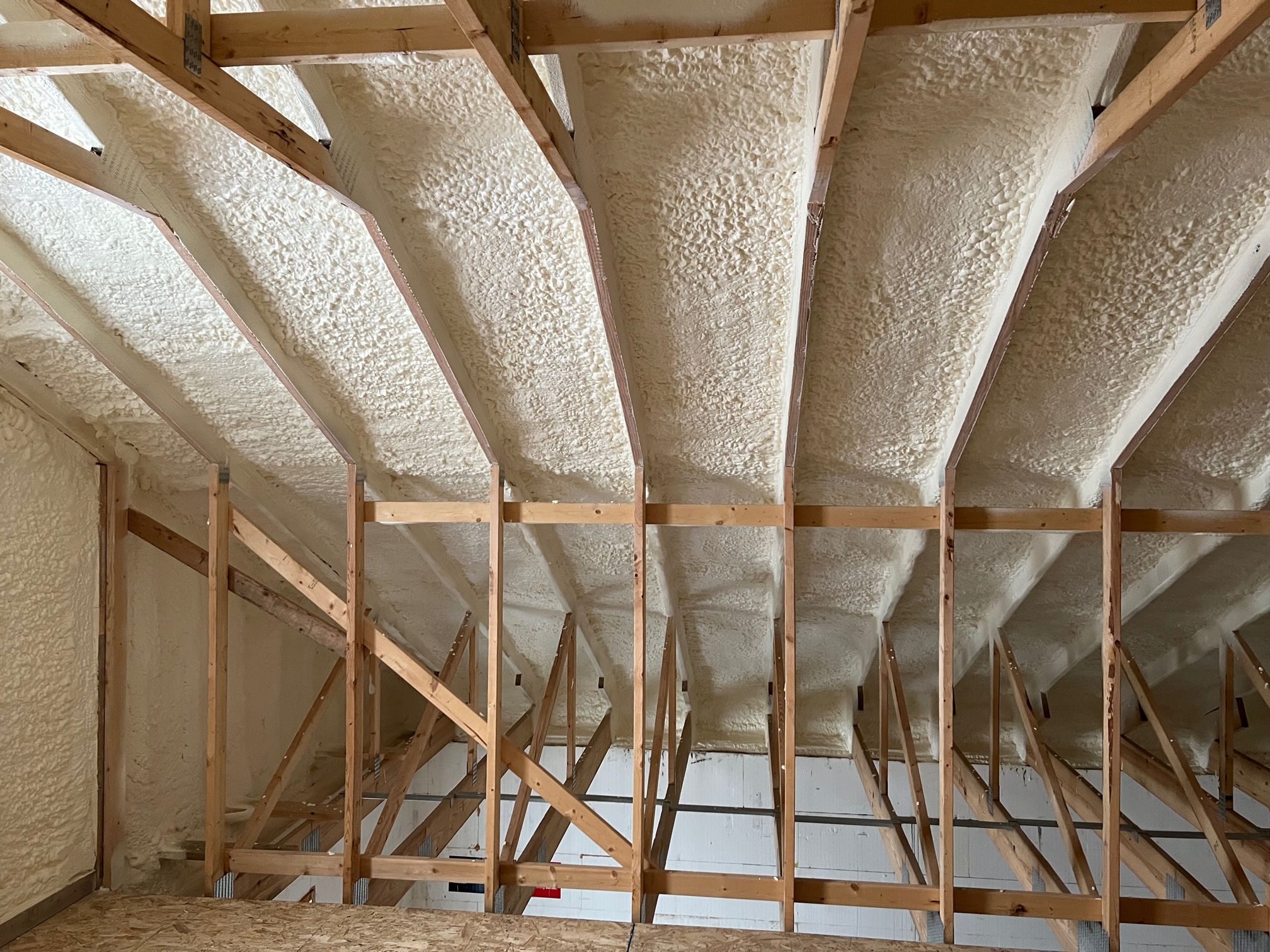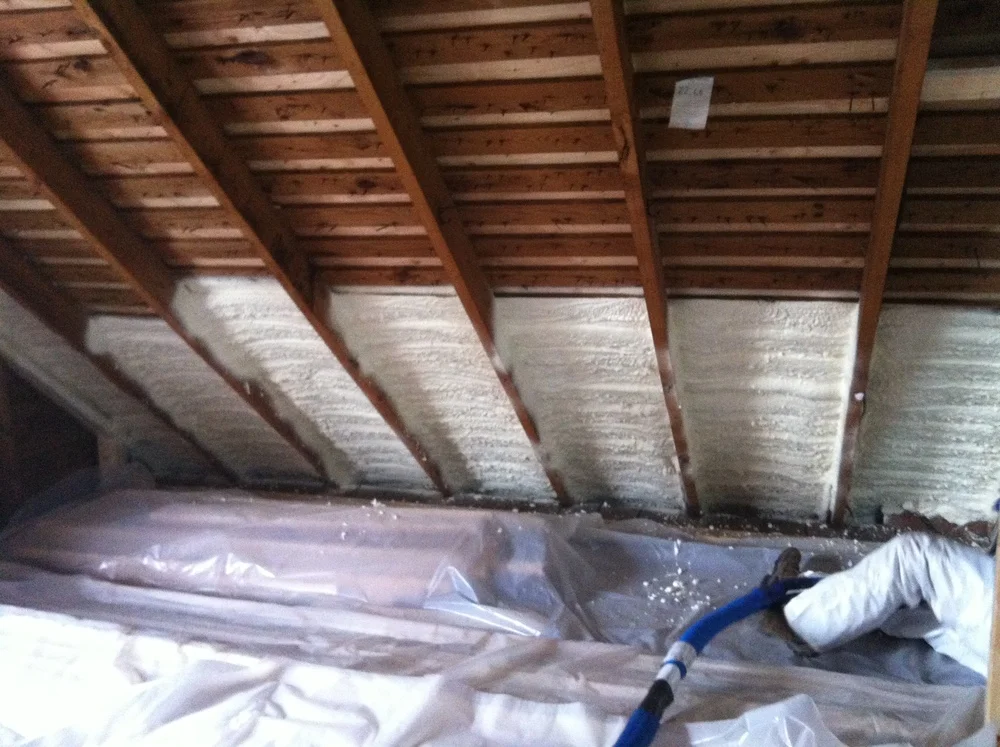Comparing Spray Foam to Conventional Insulation: Which Is Much better?
Comparing Spray Foam to Conventional Insulation: Which Is Much better?
Blog Article
Spray Foam: The Ultimate Option for Air Sealing and Insulation
Spray foam insulation has arised as a leading service for efficient air securing and thermal insulation, supplying an one-of-a-kind mix of residential or commercial properties that set it apart from standard techniques. Comprehending the complete range of its benefits, installation processes, and comparisons with other insulation types is crucial for making educated decisions.
What Is Spray Foam?
Spray foam is a functional insulation material that incorporates the concepts of air securing and thermal resistance to enhance power efficiency in buildings. Made up mostly of polyurethane or various other comparable substances, spray foam is applied as a fluid that broadens upon contact with surfaces, creating a strong, continual layer of insulation. This special property permits it to fill up voids, fractures, and spaces that standard insulation materials may neglect, supplying a superior air seal.
There are 2 major types of spray foam: open-cell and closed-cell. Open-cell spray foam is lighter and a lot more versatile, using excellent noise absorption and a reduced R-value per inch - Spray Foam. In comparison, closed-cell spray foam is denser, giving a greater R-value, wetness resistance, and added structural integrity to constructing parts
The application process usually includes specialized equipment, guaranteeing a seamless application that complies with numerous substratums, including concrete, wood, and metal. This versatility makes spray foam suitable for both brand-new building and constructions and retrofitting existing structures. Its ability to produce a closed obstacle significantly adds to minimizing power intake and boosting interior air quality, therefore making it a favored option amongst house owners and building contractors alike.
Benefits of Spray Foam Insulation
Among the most substantial advantages of spray foam insulation is its remarkable ability to produce a continuous air obstacle, which efficiently minimizes energy loss. Unlike standard insulation materials, spray foam broadens to load gaps and fractures, ensuring that air leakage is dramatically lowered. This characteristic not only enhances energy efficiency but also results in decrease utility expenses over time.
In addition, spray foam insulation supplies exceptional thermal resistance, adding to a more secure indoor setting. Its high R-value per inch enables for effective insulation in confined areas, making it optimal for attic rooms, walls, and crawl spaces. In addition, the moisture-resistant buildings of spray foam aid prevent mold and mildew and mold development, promoting healthier living problems.
One more important advantage of spray foam insulation is its sound-dampening qualities (Spray Foam). It properly reduces sound transmission between areas, creating a quieter and much more comfortable home setting. The resilience of spray foam additionally attracts attention, as it does not droop or clear up in time, preserving its efficiency throughout its lifespan
Exactly How Spray Foam Functions
Comprehending just how spray foam insulation works is vital for appreciating its performance in air securing and thermal resistance. Spray foam insulation consists of 2 primary parts: isocyanate and polyol resin. When these components are blended, they undergo a chemical reaction that causes the material to expand rapidly, developing a dense foam that fills up splits, spaces, and dental caries.
As the foam broadens, it sticks to surface browse around this web-site areas, forming an airtight seal that considerably minimizes air seepage. This characteristic makes spray foam insulation highly reliable at protecting against drafts and moisture infiltration, which can bring about energy loss and damages with time. In addition, the closed-cell variant of spray foam supplies exceptional thermal resistance due to its stiff structure, efficiently lessening heat transfer.
The special homes of spray foam enable it to conform to uneven surface areas, ensuring extensive protection and a seamless barrier. As a result, spray foam insulation not only improves power effectiveness but additionally adds to enhanced indoor air high quality by reducing the buildup of contaminants and allergens. Inevitably, recognizing the auto mechanics behind spray foam underscores its duty as a remarkable option for insulation and air securing in both commercial and residential applications.
Setup Refine Summary

Prior to setup, the room has to be effectively cleaned and prepped, guaranteeing that surfaces are devoid of debris, dust, and dampness. Since contaminants can endanger bond and general performance, this action is essential. When the area is prepared, the application involves blending both parts of the spray foam, which increases upon call and fills up gaps properly.
Trained professionals should perform the setup, utilizing specialized devices to guarantee uniform insurance coverage and ideal density. Safety precautions, consisting of wearing protective equipment and making certain proper ventilation, are imperative throughout this procedure. After application, the foam normally treatments swiftly, forming a strong barrier that enhances energy effectiveness.
Contrasting Spray Foam to Conventional Insulation
When evaluating insulation alternatives, spray foam insulation stands out in contrast to standard materials such as fiberglass and cellulose. Unlike fiberglass and cellulose, which can allow air seepage, spray foam expands upon application, filling voids and holes to create an impermeable seal.
In addition, spray foam supplies a greater R-value per inch than traditional insulation types, supplying even more effective thermal resistance in a thinner profile. This particular is particularly beneficial precede with minimal cavity deepness. Furthermore, spray foam is resistant to dampness and mold and mildew growth, which can be a substantial worry about cellulose and fiberglass, especially in damp atmospheres.
Nevertheless, spray foam insulation generally brings a greater ahead of time price than its traditional counterparts. Property owners need to consider this first financial investment versus lasting energy savings and efficiency benefits. Ultimately, while both insulation types have a peek at this website serve their objective, spray foam emerges as an advanced option for contemporary insulation requirements, specifically in regards to air sealing and thermal efficiency.

Verdict
In recap, spray foam insulation represents a highly effective option for accomplishing ideal air sealing and thermal resistance. Its special homes, including dampness resistance and noise dampening, make it ideal for different applications in both new buildings and retrofitting tasks (Spray Foam). Although the first costs may be greater compared to typical insulation products, the lasting advantages, such as significant power cost savings and improved interior air quality, justify the investment and underscore its value in modern structure practices.
Spray foam insulation has actually arised as a leading remedy for reliable air sealing and thermal insulation, offering a distinct mix of properties that set it apart from conventional methods.Spray foam is a functional insulation material that incorporates the concepts of air securing and thermal resistance to enhance energy performance in structures.When assessing insulation alternatives, spray foam insulation stands out in contrast to traditional products such as fiberglass and cellulose. Inevitably, while both insulation kinds serve their objective, spray foam arises as a much helpful resources more sophisticated solution for modern insulation requirements, specifically in terms of air sealing and thermal performance.
In summary, spray foam insulation stands for a highly effective remedy for attaining ideal air sealing and thermal resistance.
Report this page